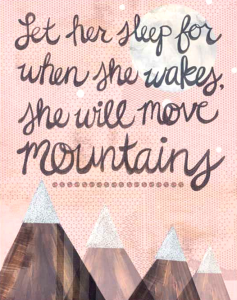Sleep is incredibly important for our physical and mental health. When I am tired, I have more trouble making decisions, solving problems, controlling my emotions and behaviours, coping with change, and challenging my eating disorder. 
 Sleep is one of the 5 key areas I have identified (along with maintaining adequate food, water, meds, and relaxation) that I need to keep on top of to give myself the best possible chance of making wise and healthy decisions and moving forward towards recovery and life. Each of the five areas are interrelated and if one starts to slip, the others quickly follow. Friedrich Nietzsche so aptly stated, ‘When we are tired, we are attacked by ideas we conquered long ago’. I have found this to be very true, and so ensuring I maintain adequate and quality sleep has been essential. Several months ago, my dietitian suggested that I start preparing for bed at around 8.30pm each night, with the aim of being well and truly in bed by 10pm. She said that the hours before midnight provide the best quality of sleep. When I am in this routine, everything seems to flow more smoothly and my capacity to challenge ineffective behaviours and engage in life increases.
Sleep is one of the 5 key areas I have identified (along with maintaining adequate food, water, meds, and relaxation) that I need to keep on top of to give myself the best possible chance of making wise and healthy decisions and moving forward towards recovery and life. Each of the five areas are interrelated and if one starts to slip, the others quickly follow. Friedrich Nietzsche so aptly stated, ‘When we are tired, we are attacked by ideas we conquered long ago’. I have found this to be very true, and so ensuring I maintain adequate and quality sleep has been essential. Several months ago, my dietitian suggested that I start preparing for bed at around 8.30pm each night, with the aim of being well and truly in bed by 10pm. She said that the hours before midnight provide the best quality of sleep. When I am in this routine, everything seems to flow more smoothly and my capacity to challenge ineffective behaviours and engage in life increases.
Some time ago, I compiled a document with a series of tips for good sleep hygiene, and I’d like to take the opportunity to share some of them with you.
- Daily Routine – Maintaining a regular daily routine when possible, with consistent times for eating, sleeping and doing other things, can go a long way to helping with my sleep. Try to go to bed at the same time each night and get up at the same time every morning. This will help my body’s internal clock and hormones that control sleepiness and wakefulness.
- In the Hour Before Bed – It is important to spend the hour before bed winding down and engaging in more relaxing activities such as a taking a warm bath, reading quietly, listening to quiet music, having a warm milk drink, and doing relaxation exercises. Activities that are stimulating should be avoided during this time. This includes exercise, watching TV, using the computer, and playing on my phone. The light emitted from these screens reduce evening levels of the sleep-promoting hormone, melatonin.
- What about meals/drinks and sleep? It is important that I do not go to bed hungry as hunger and starvation contribute to restlessness and an inability to slow down. Having an overly full stomach before bed might also make it difficult to sleep on account of heartburn/reflux and digestive issues. Having a snack or mug of warm milk before bed however, may help me to sleep better as it is rich in tryptophan which helps in the production of the sleep-inducing brain chemicals, serotonin and melatonin. Alcohol is best to be avoided before bed as although it may help me get off to sleep, it will disrupt my sleep during the night. Caffeine and cigarettes are also to be avoided as they are stimulants that can keep me awake.
- Sleep Environment – The bedroom should be quiet, dark, comfortable, and free of distractions. This may mean removing the TV, computer, radio and phone from my room. If there’s a clock in the bedroom, it is recommended that it be covered or turned around to avoid clock-watching.
- Struggling with a Racing/Overactive Mind? – Many people find that setting aside a ‘worry time’ during the day is helpful. This is a time where I can do my worrying, thinking, and planning rather than waiting til I am in bed. I find it helpful to keep a pen and paper beside my bed so that when thoughts, worries, to-do items, crop into my head, I can jot them down knowing that I can pick them up the following morning. Whilst in bed, aim to gently let go of the thoughts and not let them distract me, or replace them with calmer thoughts.
- Still Can’t Sleep? – If I am not asleep after 20 to 30 minutes of going to bed, it has been suggested that I get up, have another glass of warm milk, go to another darkened room and sit quietly. When I am tired again, go back to bed.
Sleep really is essential for my physical and mental well-being. When I follow my own advice and do all these things, life is so much better. When I let any of these areas slide, EVERYTHING seems harder! 😉 If it is an area that you struggle in, I suggest talking to your treating team about strategies that might support you.
